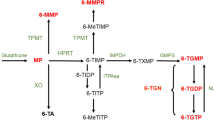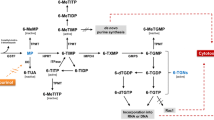Abstract
A feared complication of therapy with 6-mercaptopurine (6-MP) is myelosuppression. To evaluate whether rigorous blood count monitoring is necessary, we prospectively followed the hematologic profiles of 57 patients with inflammatory bowel disease who were treated with low-dose 6-MP. Most patients (97%) were treated initially with a single dose of 50 mg/day and 79% never used more than 50 mg/day. Blood counts were obtained at weekly intervals over the first month, every two weeks for the second month, and monthly thereafter in the first year. Sixteen (28%) developed mild leukopenia (white blood count <4.5×103/mm3). No patient had a white blood cell count <2.8×103/mm3 and no patient developed leukopenia prior to three months of treatment. In only five patients did the leukopenia prompt a change in 6-mercaptopurine dose. Very mild thrombocytopenia (platelet count of <145×103/mm3) developed in three (5%) and macrocytosis (mean cell volume >101 fl) was seen in nine (16%). In conclusion, leukopenia was not uncommon in patients treated with low-dose 6-MP, but was not clinically significant. Leukopenia occurred no earlier than three months and as late as 42 months into therapy. Thrombocytopenia was uncommon, mild, and was not associated with apparent bleeding. Macrocytosis may occur in the absence of vitamin B12 and folate deficiencies. Patients can be spared from weekly blood count monitoring when using low-dose 6-mercaptopurine treatment.
Similar content being viewed by others
References
Bernstein CN, Shanahan F: Immunosuppressive and immunomodulatory therapy for inflammatory bowel disease. Can J Gastroenterol 7:115–120, 1993
Present DH, Korelitz BI, Wisch N, Glass JL, Sachar DB, Pasternack BS: Treatment of Crohn's disease with 6-mercaptopurine. A long term randomized double blind study. N Engl J Med 302:981–987, 1980
Hawthorne AB, Logan RFA, Hawkey CJ, Forster PN, Axon ATR, Swarbrick ET, Scott BB, Lennard-Jones JE: Randomised controlled trial of azathioprine withdrawal in ulcerative colitis. Br Med J 305:20–22, 1992
Markowitz J, Grancher K, Mandel F, Daum F, for the Subcommittee on Immunosuppressive Use of the Pediatric IBD Collaborative Research Forum: Immunosuppressive therapy in pediatric inflammatory bowel disease: Results of a survey of the North American Society for Pediatric Gastroenterology and Nutrition. Am J Gastroenterol 88:44–48, 1993
Rhodes J, Bainton D, Beck P, Campbell H: Controlled trial of azathioprine in Crohn's disease. Lancet 2:1273–1276, 1971
Present DH: 6-Mercaptopurine and other immunosuppressive agents in the treatment of Crohn's disease and ulcerative colitis. Gastroenterol Clin North Am 18:57–71, 1989
Younger IR, Harris DWS, Colver GB: Azathioprine in dermatology. J Am Acad Dermatol 25:281–286, 1991
Present DH, Meltzer SJ, Krumholz MP, Wolke A, Korelitz BI: 6-Mercaptopurine in the management of inflammatory bowel disease: Short- and long-term toxicity. Ann Intern Med 111:641–649, 1989
Connell WR, Kamm MA, Ritchie JK, Lennard-Jones JE: Bone marrow toxicity caused by azathioprine in inflammatory bowel disease: 27 years of experience. Gut 34:1081–1085, 1993
Chan GLC, Canafax DM, Johnson CA: The therapeutic use of azathioprine in renal transplantation. Pharmacotherapy 7:165–177, 1987
Lennard L, Van Loon JSA, Lilleyman JS, Weinshilboum RM: Thiopurine pharmacogenetics in leukemia: Correlation of erythrocyte thiopurine methyltransferase activity and 6-thioguanine nucleotide concentrations. Clin Pharmacol Ther 41:18–25, 1987
Van Loon J, Weinshilboum RM: Thiopurine methyltransferase biochemical genetics human lymphocyte activity. Biochem Genet 20:637–658, 1982
Sandborn WJ, Tremane WJ: Measurement of thiopurine methyltransferase (TMPT) activity in patients with inflammatory bowel disease (IBD) does not predict side effects from treatment with 6-mercatopurine (6-MP) or azathioprine. Gastroenterology 104:A774, 1993
Wickramasinghe SN, Dodsworth H, Rault RMJ, Hulme B: Observations on the incidence and cause of macrocytosis in patients on azathioprine therapy following renal transplantation. Transplantation 18:443–446, 1974
Lennard L, Murphy MF, Maddocks JL: Severe megaloblastic anemia associated with abnormal azathioprine metabolism. Br J Clin Pharmacol 17:171–172, 1984
Roman J, Westervelt F, Atuk N, Wheby M: The occurrence of megaloblastic anemia with normal serum folate during antipurine therapy. Clin Res 21:94, 1973
Kuks JBM, Djojoatmodjo S, Oosterhuis HJHG: Azathioprine in myasthenia gravis: Observations in 41 patients and a review of literature. Neuromusc Dis 1:423–431, 1991
Author information
Authors and Affiliations
Rights and permissions
About this article
Cite this article
Bernstein, C.N., Artinian, L., Anton, P.A. et al. Low-dose 6-mercaptopurine in inflammatory bowel disease is associated with minimal hematologic toxicity. Digest Dis Sci 39, 1638–1641 (1994). https://doi.org/10.1007/BF02087769
Received:
Revised:
Accepted:
Issue Date:
DOI: https://doi.org/10.1007/BF02087769




